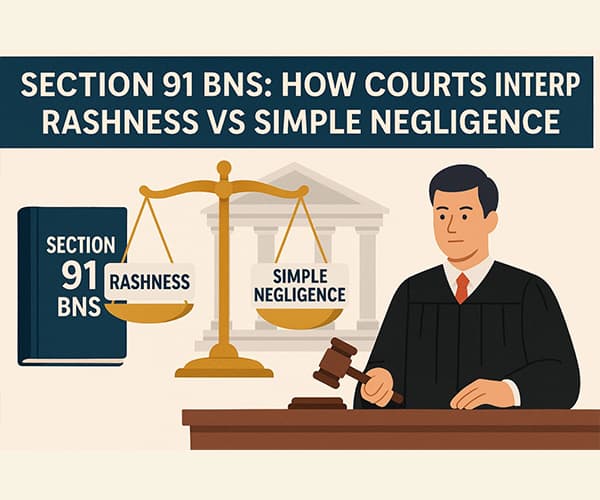Section 91 BNS: How Courts Interpret Rashness vs Simple Negligence

Section 91 of Bharatiya Nyaya Sanhita (BNS) stands as a vital legal tool in India's new criminal justice system, underpinning both evidence-gathering and the deeper judicial analysis of behaviour in criminal cases. One recurring challenge for courts operating under Section 91 BNS is the distinction between "rashness" and "simple negligence." This differentiation is more than academic, it directly impacts criminal liability, sentencing, and the fair administration of law.
When examining offences requiring the production of evidence or records under Section 91 BNS, especially those involving accidents, mishaps, or procedural failures, Indian courts must carefully consider whether the conduct in question reflects "rashness" (a blatant, unjustified disregard for risk) or mere "simple negligence" (a failure to take reasonable care).
Rashness, as interpreted in the context of Section 91 of Bharatiya Nyaya Sanhita, involves acts performed with conscious disregard for an obvious risk to life, safety, or property. Rashness implies recklessness or gross indifference, like speeding on a busy road knowing the hazards, or ignoring critical safety warnings in a factory environment. In such cases, the courts consider whether the accused appreciated the likely dangerous consequences and yet chose to act anyway.
Simple negligence, on the other hand, is a milder form of carelessness. Under Section 91 BNS, this could manifest as forgetting a routine safety check or unintentionally overlooking a regulatory detail, with no intent to cause harm and without an egregious disregard for others' safety. Courts weigh whether a reasonable person, given the same circumstances and information, would have exercised greater caution.
In application, courts reviewing cases under Section 91 BNS require concrete evidence, such as CCTV, procedural manuals, communication trails, and expert testimony, before deciding if the accused's conduct was rash or negligently innocuous. The distinction is crucial because rashness, seen as a greater threat to public safety, attracts harsher penalties and less leniency, while simple negligence may result in lighter sentences or even acquittal if mitigated by extenuating factors.
With the digitization of records and new forms of risk in the workplace and daily life, Section 91 BNS empowers courts to draw on broad evidence to form a nuanced, fair judgment about the defendant's mental state and conduct. The key focus remains on whether there was a clear awareness of risk (rashness) or only an unintentional lapse of standard care (negligence).
If you or your business are caught up in a case where Section 91 Bharatiya Nyaya Sanhita is invoked, especially when allegations hinge on the difference between rashness and negligence, it is essential to have expert legal counsel. The experienced team at Vakeel Saab can help analyze evidence, challenge unfair allegations, and ensure that courts interpret your actions accurately under Section 91 BNS. For tailored legal solutions and robust representation, call +91 72848 72848 or visit www.vakeelsaab.com today.
Frequently Asked Questions – Section 91 Bharatiya Nyaya Sanhita
Q1: How do courts differentiate rashness and simple negligence under Section 91 BNS?
Courts assess the degree of awareness and disregard for risk, rashness is conscious recklessness, while simple negligence is an inadvertent failure to exercise ordinary care.
Q2: What evidence is most relevant in proving rashness under Section 91 BNS?
Surveillance footage, internal reports, whistleblower statements, and expert opinions showing blatant disregard for known risks are all persuasive.
Q3: Does a finding of rashness under Section 91 BNS always lead to harsher punishment?
Yes, compared to simple negligence, rashness typically results in stricter penalties because of the greater threat posed to public safety.
Q4: Can digital negligence be punished under Section 91 BNS?
Absolutely. Mishandling of digital records or willful disregard of cybersecurity risks can be prosecuted under this section if they endanger safety or obstruct justice.
Q5: What defence is available for allegations of simple negligence under Section 91 BNS?
Defendants can prove adherence to standard practices, absence of gross carelessness, and unintentional error to mitigate or defeat liability.
Q6: Are all mistakes under Section 91 BNS treated as crime?
No, only those rising to the level of rashness or significant negligence that creates risk for others or hinders justice are criminal, minor, honest mistakes often avoid penal consequences.
Q7: Who can be summoned under Section 91 BNS for evidence in rashness/negligence cases?
Any individual, employee, or organization in possession of relevant documents or records can be compelled to produce them for judicial scrutiny.
Q8: Is expert testimony required in deciding rashness or negligence under Section 91?
While not mandatory, expert opinions often help clarify whether accepted standards were breached and the relative seriousness of the lapse.
Q9: What are the penalties for rashness vs simple negligence under Section 91 BNS?
Rash acts may lead to imprisonment, higher fines, and stricter judicial censure, whereas simple negligence usually triggers less severe outcomes.
Q10: Where can I find specialized legal support for Section 91 BNS proceedings?
Contact Vakeel Saab at +91 72848 72848 or visit www.vakeelsaab.com for the most up-to-date, strategic defence against allegations under Section 91 BNS.
Tags: Section 91 Bharatiya Nyaya Sanhita, Section 91 BNS, rashness vs negligence Section 91, Section 91 BNS legal process, Section 91 BNS court interpretation, Section 91 penalties, Section 91 evidence records, Section 91 BNS lawyer, Vakeel Saab Section 91, Section 91 criminal law, Section 91 defence, endangering safety BNS, Section 91 BNS FAQs, best criminal lawyer Section 91, rashness offences BNS, negligence Section 91 BNS, new criminal law India
Related Articles
The Importance of Consulting a Property Lawyer for Real Estate Issues
Blog
How to File a POCSO Complaint in India: Step-by-Step Legal Process
Blog
What punishments does the law give for giving, taking, or asking for dowry?
Blog
Reasons for the Increasing Divorce Rates in India
Blog
What is a Special Leave Petition? Meaning, Features, Process & & Who Can File?
Blog
What Is the Difference Between Mutual Divorce and Contested Divorce?
Blog